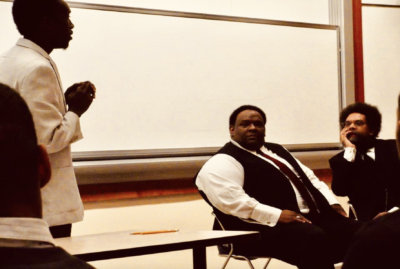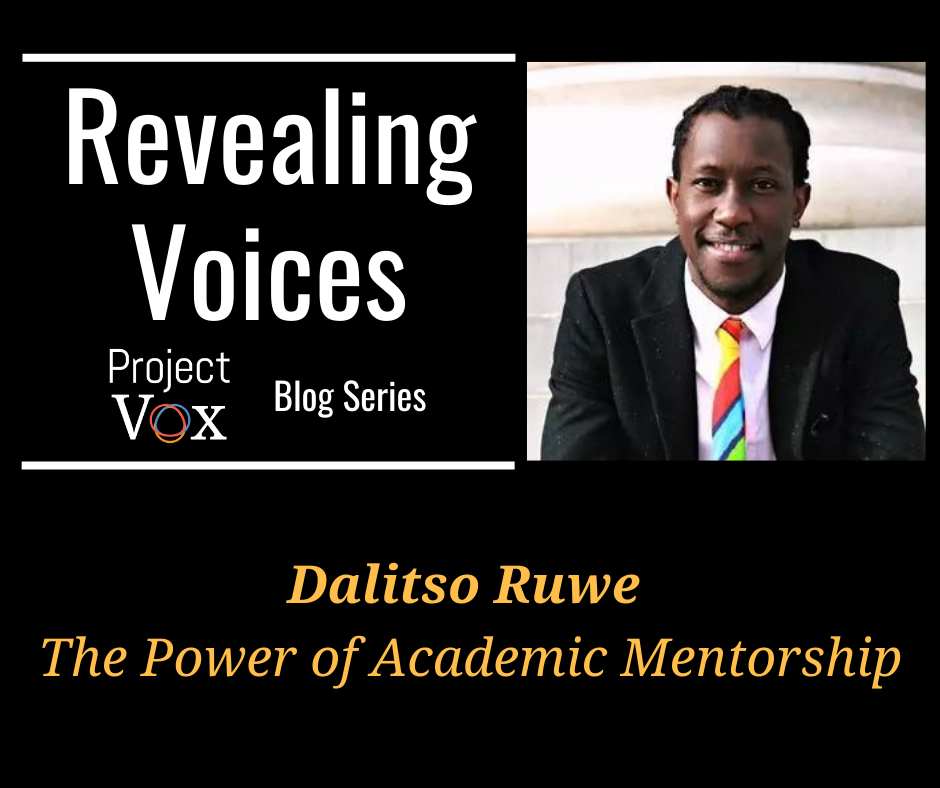Dalitso Ruwe’s post is part of our Revealing Voices blog series.
In 2019, I became the first Black person to obtain a Doctor of Philosophy Degree in philosophy from Texas A&M University. My time at Texas A&M made me appreciate the different traditions of philosophical inquiry. In the areas of research, I was drawn particularly to the Intellectual History of Africana Philosophy. In this entry, I intend to reflect on the power of community and networks through anecdotes that have shaped my research interests in Africana philosophy. In 2002, I relocated to Boston, Massachusetts, U.S., from Lusaka, Zambia, and joined my family. At the time, my Dad, Dr. Field Ruwe, was working on a manuscript for his second novel titled Pearly Gates: Trials and Tribulations of Fisha Bayu. The protagonist is a young African refugee who flees a civil war. After his release from prison for a crime he did not commit, Fisha aspires to be a lawyer and confronts the legacy of colonialism. During dad’s writing, I remember the house becoming a space in which to engage in critical dialogue about race, Black traditions of resistance, and the destiny of the continent of Africa. One important lesson I learned observing my dad write was the amount of effort he put in researching a topic; the perseverance to find sources and engage in material history to tell a story about how Black people produce ideas that affirm their humanity and contributions to human civilizations.
Lessons learned from him would become handy in 2007, when as a sophomore at Fresno State I first met a Visiting Professor, Dr. Julius Bailey, in “Hip Hop Philosophy.” I remember attending the class informally and being mesmerized by his fluidity. He moved with ease between the western canon, African American literature, and African American Vernacular English. When the 50-minute lecture was over, I knew I wanted to do what Dr. Bailey did—be a Black philosopher. I approached Dr. Bailey after class and asked him if he could be my mentor. He said before he could mentor me, I first had to read one hundred books within a year. He said that’s what his mentor Dr. Cornel West had done to him when he studied with him at Harvard. Dr. Cornel West is one of the most recognized Black philosophers in the last fifty years. Of the 23 books written by him, he is best known for his 1993 classic Race Matters. I had a chance to read Race Matters as a freshman in 2006 in my “Intro to African American Studies.” There was no way I was going to pass on the challenge.
Under the tutelage of Dr. Bailey, I’ve had the fortune to meet Dr. West on two occasions. The second time is probably my most memorable. I remember carrying a bag with ten books to dinner with Dr. West. My goal was to ask him to sign them. Initially, I was shy to ask him to sign, the occasion being dinner. But when I did, he obliged without hesitation. The moment felt full circle for me. The ten books felt like a culmination rite of the 100-book challenge Dr. Bailey had assigned me. One piece of advice Dr. Bailey gave me from the challenge was to read the biography of a philosopher before the content. He insisted on understanding how a philosopher lived, and who influenced them and how they sought to create a voice within the tradition that influenced them. These lessons set me on a path to learning the importance of studying genealogies of thought; I had to employ them in 2016 when Dr. Tommy Curry recruited me to undertake my graduate studies with him at Texas A&M. I thought I knew a great deal about Frederick Douglass until Dr. Curry offered alternative reading in one of his classes. Anyone who has had the chance to meet Dr. Curry knows the man is a savant. Dr. Curry schooled me and opened my eyes to a host of thinkers that influenced Douglass. Regular interactions with him led to my studying Black genealogies and digging into the archives of Black philosophical inquiry.

One of my memorable archival tours in grad school was the Derrick Bell Archives at New York University. Derrick Bell was a prominent civil rights attorney whose professional input in the Brown v. Board case helped end school segregation. Bell is also known as the founder of Critical Race Theory. What I observed at the archives is that in the creation of Critical Race Theory, Bell studied American history through the legal cases that related to Black life from slavery through our contemporary times. Looking at the syllabus from his classes, Bell created hypothetical scenarios that immersed his students in a period when a famous case pertaining to Black people appeared before the courts. The goal was for his law students to engage Black issues to come up with solutions that challenged laws that shaped America’s race relations. The hypothetical scenarios became the cornerstone of Critical Race Theory. Bell’s research and teaching strategies have shaped my own. Most recently, Bell’s research strategies helped me land a prestigious international post-doc, “Extending New Narratives in the History of Philosophy,” centered on studying early Black loyalist petitions and abolitionist writings in Canada.
I share these anecdotes to say that a philosopher does not exist in a vacuum but rather in networks and communities of people who shape who they become. In my research, this means when researching Black thinkers, I must think about the Black communities that nurtured their gifts and how they aspired to be accountable to these communities in their philosophical inquires. After all, we are not only a reflection of our habits but also the influence of others on our lives. In other words, the task of revealing a voice is not only about appreciating its concerto but also the orchestra it exists in and story of the human condition they share on center stage.
Dalitso Ruwe is an Assistant Professor of Black Political Thought at Queen’s University. He holds a cross appointment in Philosophy and Black Studies. Previously he was a 2020-2021 postdoctoral fellow under the Extending New Narratives in the History of Philosophy at University of Guelph. Dr. Ruwe is currently working on a manuscript tentatively titled Ontological Sovereignty: The Quest of Black Freedom in the Age of Slavery.


